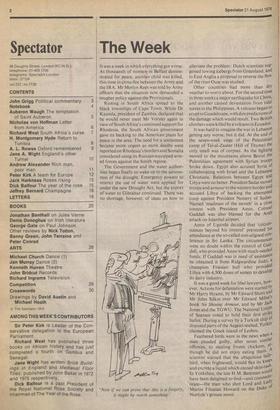The Week
It was a week in which everything got worse. As thousands of women. in Belfast demonstrated for peace, another child was killed, this time in cross-fire between the Army and the IRA. Mr Merlyn Rees was told by Army officers that the situation now demanded a tougher policy against the Provisionals.
Rioting in South Africa spread to the black townships of Cape Town. While Dr Kaunda, president of Zambia, declared that he would never meet Mr Vorster again in view of South Africa's continued support for Rhodesia, the South African government gave its backing to the American plans for peace in the area. The need for a settlement became more urgent as more deaths were reported on Rhodesia's borders and Somalia considered using its Russian-equipped armed forces against the Smith regime.
The Government and the water authorities began finally to wake up to the seriousness of the drought. Emergency powers to restrict the use of water were applied for under the new Drought Act, but the export of water to Gibraltar continued. There was no shortage, however, of ideas on how to
alleviate the problem: Dutch scientists suggested towing icebergs from Greenland, and in East Anglia a proposal to reverse the flow of the river Ouse was studied.
Other countries had more than dry weather to worry about. For the second time in three weeks a major earthquake hit China, and another caused devastation from tidal waves in the Philippines. A volcano began (0 erupt in Guadeloupe, with dire predictions of the damage which would result. Two British climbers were killed by a volcano in Ecuador.
It was hard to imagine the war in Lebanon getting any worse, but it did. At the end of the seven-week siege of the Palestinian camp of Tel-al-Zaatar (Hill of Thyme) the only smell was of corpses. As the fighting moved to the mountains above Beirut the Palestinian agreement with Syrian troops broke down. Egypt also accused Syria of collaborating with Israel and the Lebanese Christians. Relations between Egypt and Libya were no better. President Sadat moved troops and armour to the western border and accused Libya of backing the attempted coup against President Nemery of Sudan. Named 'madman of the month' in a close contest with President Amin, Colonel Gaddafi was also blamed for the Arab attack on Istanbul airport.
Amin of Uganda decided that 'circurnstances beyond his control' prevented his attendance at the so-called non-aligned conference in Sri Lanka. The circumstances were no doubt within the control of Gaddafi, who provided Amin with much-needed funds. If Gaddafi was in need of assistance he obtained it from Ridgwardine Judo, a champion Friesian bull who provided Libya with 4,500 doses of semen to develoP its dairy industry.
It was a good week for libel lawyers, however. Actions for defamation were started bY Mr Harry Hyams, by Mr Edward Short and Mr John Silkin over Mr Edward Milne s book No Shining Armour, and by Mr Jack Jones and the TGWU. The National Union of Seamen voted to hold their first strike ballot. During a survey by a Turkish shiP °I disputed parts of the Aegean seabed, Turkey claimed the Greek island of Lesbos.
Feathered birds were in the news when" man pleaded guilty, after seven similar offences, to stealing frozen chickens, ale though he did not enjoy eating them ,A scientist warned that the ubiquitous la0Ybird, when frightened, would flex its knees and excrete a liquid which caused skin-rash: In Yorkshire, the late H. M. Bateman woule have been delighted to find—and commer°, orate—the man who shot Lord and LOY,. Martin Fitzalan Howard on the Duke ° Norfolk's grouse moor.


































 Previous page
Previous page